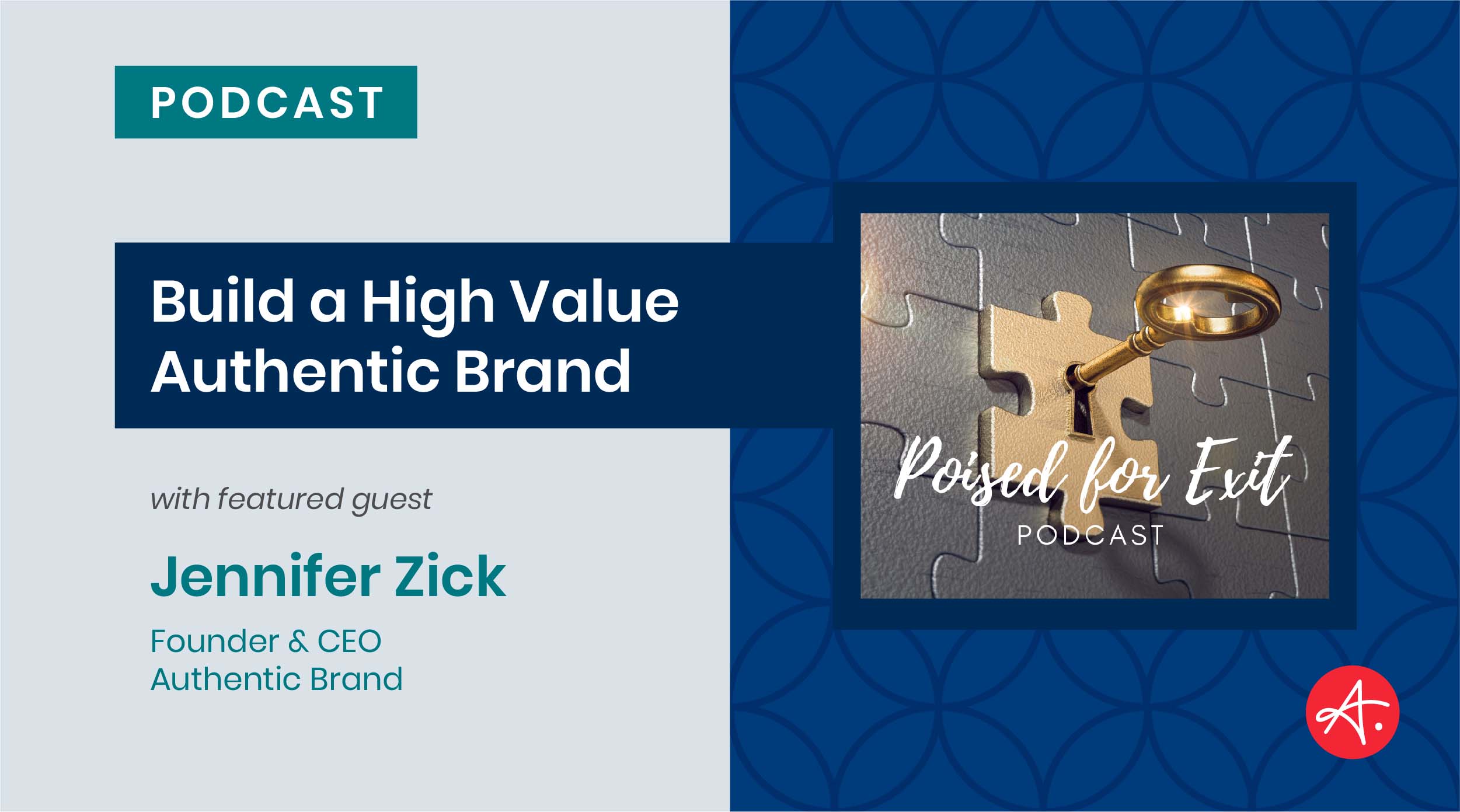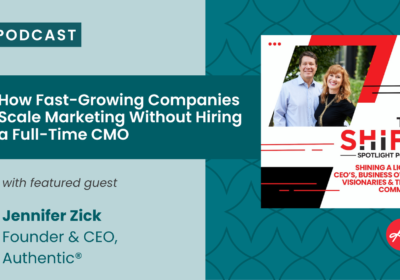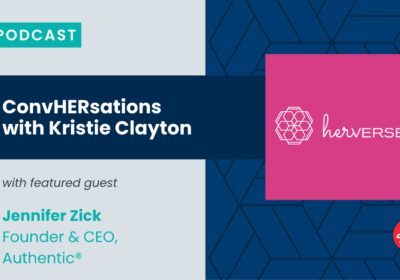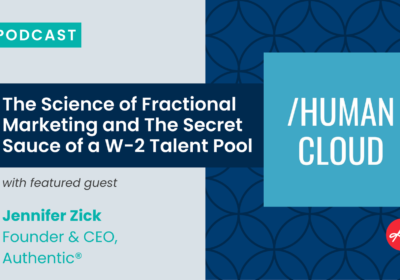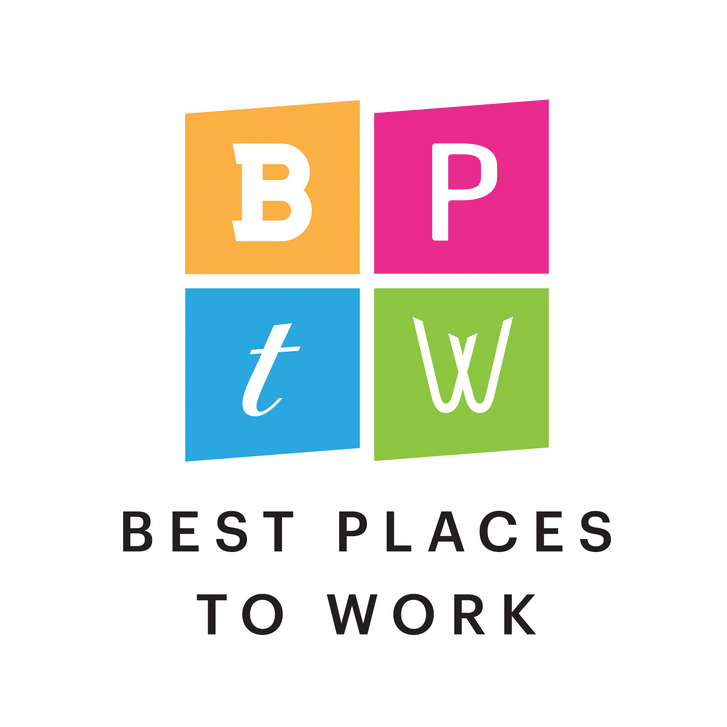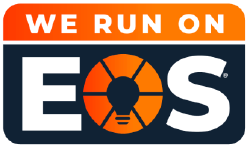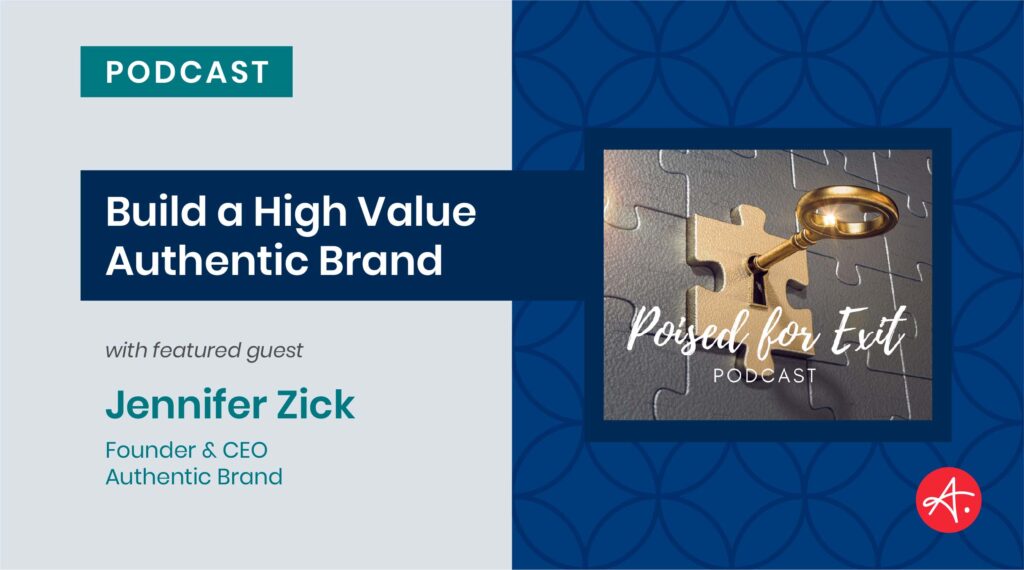
Our founder and CEO, Jennifer Zick, was recently the featured guest on the Poised for Exit podcast with host, Julie Keyes.
In this episode, Jennifer discussed the important role of the CMO for growing businesses and the fractional CMO model. Fractional CMOs work with the internal leadership team of companies to quarterback the marketing strategy and implementation, and provide resources and insights to build the company’s brand through measurable and effective marketing tactics.
Jennifer also discussed Authentic’s proprietary Authentic Growth® Methodology that is designed to help our clients stay focused on the right marketing strategies to drive results.
Listen to the Podcast
Key Takeaways
- Fractional CMO services provide growing businesses with executive marketing leadership on a part-time basis, acting as a marketing quarterback to integrate strategy, leadership, and execution without the cost of a full-time CMO.
- Many small to mid-size companies engage in uncoordinated, unmeasured marketing activities – termed “random acts of marketing” – and benefit from strategic alignment, accountability, and measurable frameworks to drive healthy growth.
- The proprietary Authentic Growth® framework guides marketing decision-making by ensuring clarity on purpose, audience, and effective engagement to build trust and brand equity.
- Strategic marketing leadership helps businesses identify market fit, niche down, productize services, and achieve strong exits, such as one example where a company sold for 11x EBITDA after repositioning efforts.
- Building brand equity requires consistently delivering on brand promises, fostering trust equity, and leveraging personal leadership presence to transfer trust to the business brand and team for scalable growth.
Full Episode Transcription
Introduction & Background
Julie Keyes: Poised for Exit is a show for business owners who want to achieve a successful exit based on their own terms. Your business exit will likely be the biggest financial transaction of your life and for most, you’ll have one shot at doing it right. The topics and guests we feature and the stories they share will provide valuable ideas and strategies to improve operations and grow enterprise value so you can achieve the best possible exit outcome. Now here’s your host, award winning certified exit planning advisor Julie Keyes.
Welcome everyone to Poised for Exit, the podcast show for business owners. In this episode we have the honor of interviewing the founder and owner of a firm that specializes in delivering fractional Chief Marketing Officer services. She does a booming business all over the country and the need for these CMO services is on the rise. We’re going to hear from her shortly, but first let’s hear from our very important sponsors, Sunbelt Business Advisors and TrustPoint.
TrustPoint will design and manage a 401k plan that fits your company’s needs. They handle everything from the record keeping and investments to employee education and ongoing administration. And they take on the highest level of fiduciary responsibility to ensure your 401k plan is compliant. You already have plenty to keep you up at night. Your 401k plan should not be one of them. Let their experts help you with a complete plan solution, saving you time to focus on what you do best your business. Visit trustpointinc.com for more details.
Here in the studio with Jennifer Zick who is the Founder and CEO of Authentic. Jennifer, what a pleasure to have you here for this show.
Jennifer Zick: I am delighted to be here and in person, actually looking at each other. What a treat.
Julie Keyes: I know. Isn’t it great? Yeah. We try to get as many people in person as we can in the studio here at Poised for Exit, but it doesn’t always happen. And sometimes people are out of town. Sometimes it just doesn’t work, health wise or weather wise. But today it worked. And here we are.
Jennifer Zick: Here we are. I love it.
Julie Keyes: Me too. Me too. And like I said in the opener, you own a firm that specializes in chief Marketing Officer services. So CMO services, fractional cfo or I’m sorry, CMO services. And I understand that business is booming, so very exciting to hear about that. But before we get into the interview and learning about you, learning about the business, how did you get here? Like, how did you get to this place in your life? I mean, what a journey, how successful you are. I’m so happy for you.
Jennifer Zick: Well, thank you for that. It certainly hasn’t been a straight line journey. It’s been a lot of twists and turns and ups and downs. And anyone who knows my backstory knows that never had I planned on being an entrepreneur. It was actually through a long series of wonderful opportunities in my career as well as many missed shots that taught me a lot of really important lessons that got me into a mindset and a heart set where I was ready to take that leap of faith. So six years ago, I founded Authentic. And my career prior to that had been primarily in sales leadership and marketing leadership around B2B professional services. So that’s the space in which I grew up. And I had a wonderful trajectory of growth in that space, but always had this little seed of entrepreneurship in my heart.
And it took a job loss to bring that seed to fruition. It was the first time I ever lost a job that I took a pause and looked at my life and evaluated what I really wanted out of it. And most importantly, I didn’t want to live with any regrets. So I knew I needed to take a step forward and if I failed, well, I could go look for another job.
Julie Keyes: Well, it’s just. I can’t believe it. It’s befuddling to me how you could have lost a job because you’re such a rock star. So, I mean, what a mistake on their part. Right?
Jennifer Zick: Well, thank you. That’s very kind of you. And I mean, I would like to say it’s all on them, but I do. There’s some responsibility I take. The job that I ended up losing was in a company that was going through a lot of change after multiple acquisitions and integrations and a lot of chaos. And I stepped into that chaos, and there was some dysfunction there that I probably should have addressed differently in the role I was in. But I absorbed it and wanted to show up and look strong. And I wasn’t as vulnerable and perhaps honest with myself and others as I needed to be. So losing that job while still being successful in the role and building a great team was probably. It absolutely was the best thing that could have happened to me. It set me free.
Julie Keyes: It didn’t? I mean, you wouldn’t be where you are now if that wouldn’t have happened.
Jennifer Zick: That’s right.
Julie Keyes: And you know this. I know this. Well, you lived it with integration, right? I’m living through that with some clients right now who are going through some integration. It’s not easy.
Jennifer Zick: No, it’s not.
Julie Keyes: Bringing teams together like that. And if it’s not done for the right reasons, I mean, it can be really difficult. Now, I also know, too, from what we’ve talked about and the focus that you have at your company, it’s kind of strange because it mirrors my focus, especially for 2023, in wanting to really help business owners focus on growing the value of their business, which is what, of course, authentic brand does.
Jennifer Zick: That’s right. And the way that we express that is that we help growing businesses to Overcome Random Acts of Marketing® and confidently take the next right step toward healthy growth. And on the marketing side, that’s often looked at as revenue, but there are so many pieces that contribute to healthy growth. And revenue alone doesn’t create value in a business. And you know that better than most. And so I think we’re going to dive into that a bit today.
Business Model and Services
Julie Keyes: Definitely. So random acts of marketing. Give me an example of what that might look like. I love that.
Jennifer Zick: So that now copyrighted tagline of ours originated when I was first starting the business and I was the salesperson and in all the seats in the company, of course, and meeting with CEOs and meeting with CFOs and understanding their pains. And one day that phrase slipped out of my mouth and the eyes got wide in the room and they’re like, I can relate. So. So in our world, we work with entrepreneurial businesses that are usually between 5 million and 100 million in annual revenue. That’s our sweet spot. And inside that sweet spot, random acts of marketing take a lot of shapes. But what it often looks like is an unclear message to an unclear audience. It’s unaccountable marketing spend without knowing how to measure the result of that. It’s the frustration of chasing shiny objects and not giving it enough time to prove itself out.
It’s turnover on the marketing team because small companies who have never built a strategic marketing team don’t know who to hire. Do you need somebody with social media expertise, strategic expertise, and public relations? It’s a very complicated and fast changing ecosystem. So there’s a lot of room for random acts.
Julie Keyes: Well, when you know marketing is always, it’s always been very important to me. I went to school for it a very long time ago, but that was my focus when I was in college. I think that marketing is kind of an ambiguous term. Kind of like saying, well, I’m in medicine. Oh really? Veterinary medicine? Pediatric medicine. Right. I mean there’s so much to marketing that maybe breaking that down a little bit and focusing on telling our audience specifically, what does Authentic do?
Strategic Framework
Jennifer Zick: Yes. Well, the services that we sell, obviously you’ve explained fractional CMO. That’s all we do. We provide executive marketing leadership for growing businesses. And so that’s what we do. But why we do it is to help organizations increase their marketing maturity through the wisdom that comes with the experience and getting things in the right order, in the right way, with the right investment mindset, with the right expectations for healthy growth and value. And how we do it is through our methodology, which is called Authentic Growth®. And it’s a framework for marketing decision making, alignment and accountability. And you mentioned going to school for marketing a long time ago and I’ve already mentioned how fast marketing is changing. But the interesting thing is that the fundamentals of marketing have never changed. Correct.
It’s always been about what is our life changing purpose for existence as a business, why are we even here? What’s the purpose? And then underneath that purpose, then who matters to us and why should we matter to them? And when we have clarity on that, then the question about what to do for marketing tactically is how do we intersect their natural habitat in a way that we capture their attention, build trust so that they want to engage with us and we can provide value. Right. That’s what marketing always has been. It’s just the mechanisms for how to answer those questions are changing.
Julie Keyes: And so the people that you work with on the inside then, or I should say your staff works with, are you primarily working with the CEOs of the company? Are you working with the sales department? I mean, who are your primary contacts within the company?
Jennifer Zick: Well, our buyer, our customer is the CEO or founder. It’s the head of the business. When we step into a fractional role, we become part of their leadership team, of course. So we’re embedded just on a part time basis. And so we then are first and foremost, the CEO is our client. The leadership team is our group of peers where we provide business advisory input like any executive. And then we build, manage and implement marketing by leading the marketing team, which for most growth businesses is some combination of internal resources and external agency, contract or other freelance resource. So integrating all those efforts and making sure everyone’s in alignment so all the way through.
Julie Keyes: So you’re like the marketing quarterback.
Jennifer Zick: We absolutely are the marketing quarterback, yeah.
Julie Keyes: Right. And I would assume too, you know, with a lot of the firms that you work with, because you’re not going to work with the really small companies, they probably can’t afford to hire somebody like you, even though they need your services. Right. But yet, you know, working with those lower middle market companies, obviously they’ve got marketing firms that they work with that, you know, handle their SEO and their website design and you know, all of that. Right. And so you guys go in and coordinate all of that and take it off the plate of the people who probably don’t have the time or expertise for it anyway.
Jennifer Zick: Right, that’s right. Well, I want to answer two things about the size of the company we work with and how we align with their external partners. And I’ll start with the latter. So every business that we work with is doing something in marketing, right? No business is doing nothing. If they have a company name, they’re marketing somehow. Right. So we step into some kind of work stream and relational stream and our job is to make that effort more effective while also defining the future of those efforts. Right. And so we love collaborating with agencies. What we often see with our clients is the business has been founder led, sales driven with some random acts of marketing.
We are the first strategic marketing leader in the organization and it’s our job to make sure that we understand the strengths and capabilities of the partners they’re working with and we make them more effective. And we’re often taking that responsibility from the shoulders of either the founder or the head of sales, who really is not a marketing leader. Right, right. And then working alongside them. And what we usually find, interestingly enough, is that many of these companies find feel like their agencies haven’t been effective for them, when in reality the agency partners probably have really great capabilities, but they’ve not had a translator between them and the business, not someone who speaks marketing language and knows how to optimize the work they’re doing or integrate it.
I mean, an SEO firm needs to have a connection to the designers and the copywriters who are bringing the work they do to bear, right?
Julie Keyes: Yes.
Jennifer Zick: So we provide that integration component. And it’s true that while we work with businesses that are more established and growing, the 5 million up is our sweet spot. This year we’ve actually introduced a new suite of services that we’re calling advisory services. Because we spend so much time in the entrepreneurial ecosystem, we tend to attract a lot of earlier stage rising star companies that want to work alongside us because they know they need the wisdom sooner than later, but they’re not ready for a committed, embedded, fractional CMO quite yet. And so we’re now offering a suite of advisory services where we come alongside more as a coach and partner to the executive team or their marketing organization.
And we’re able to bring our same tools and methodology, the same wisdom of our CMO community alongside of them, but without being quite as embedded.
Julie Keyes: Sure. So it’s a stair step approach. And really I talked about this. This morning I had a speaking engagement for EBITDA Partners. It was super fun to be there in person. Like I was telling you before, and I just reminded everyone in the room, because it was a room of advisors, there are two things that drive revenue. Right. Everything else takes, you know, kind of sucks money out of the company. Two things that drive revenue are sales and marketing. Is the marketing working? Is it supporting sales? Is it driving revenue, you know, good leads? So that’s what you do.
Jennifer Zick: That is what we do. And, we’re also educating clients about the role of marketing in revenue creation and sustenance and value building that goes beyond lead generation. Because in the days of, you know, when I was first stepping into the sales and marketing space and I was in sales before I was in marketing, the marketing toolkit 20 years ago was advertising, trade shows, publications. Right. We know there was a limited set of tools which were all about brand building and lead creation. But today the marketing discipline covers the entire customer journey.
And where I find a huge imbalance with businesses that don’t have mature marketing muscle is that they forget that the probably the highest value that marketing can play in their organization is to nurture existing clients, turn them into raving fans and advocates, make sure they’re aware of the other service or product offerings within the business. We all know it’s way more expensive to win new business than to keep retaining. Grow your existing business and so we find a lot of marketing plans that are over invested in lead gen and way under invested in retention advocacy.
Julie Keyes: I agree 100%. I see that so much. And you know, to your point about, I guess they used to call it horizontal growth. Right. Taking the database of clients that you have and then expanding the products and services that you sell to the people that already know you, love you and trust you. Right. And using your marketing strategy to be able to get to them and get that message out.
Brand Equity and Trust Building
Jennifer Zick: Yes. And to do that, sales and marketing teams work closer than ever. Right. As a revenue team. And yet I think there’s a little bit of confusion that’s been caused over the last decade or so about what is a CRO, a Chief Revenue officer, and what is this idea of one revenue organization. And some people have actually reverted with this CRO role to simply a glorified head of sales that still doesn’t have the marketing acumen. Right. So to get a revenue engine working in a growth business, you really do need strategic marketing. That’s dedicated strategic sales leadership.
Julie Keyes: Dedicated, definitely. So let’s talk a little bit more about brand building. You had written an article recently called Brand Equity. Let’s talk about that.
Jennifer Zick: Yeah. Well, that’s an article we shared recently based on some speaking that I did. It all started adjacent to our core work at Authentic. Anyone who follows me on LinkedIn sees that I’m pretty active there.
Julie Keyes: Yes.
Jennifer Zick: I’ve been intentional about being a personal brand as the figurehead of Authentic in a way that supports and grows our corporate brand at the same time. And eventually over time, people started asking me, what is the formula for how you do this? And I’m like, I don’t actually have a formula, it’s just what I do. But I finally decided to sit down and assess for myself how it is that I implement this in my business. And it was that exercise that helped me to put together a framework for how to build trust equity. And there are several steps in that process, but it’s really about for a. This concept I wrote for founders for entrepreneurs, many of whom have a tendency to kind of be accidental entrepreneurs. They’re building a business.
It’s been about them and their brand and their name, but it becomes something bigger. And how do they transfer the trust of their name into the business? But aside from just founders, the idea, this concept of building brand value and trust equity, I could explain it as this. My background, as I said, has been in B2B professional services. Right. We sell something that’s intangible and it’s done through very high value relationships. And you already said the words know like and trust.
Julie Keyes: Right?
Jennifer Zick: Right. People want to work with businesses they know, like and trust. And there are aspects of that are true in B2C too, especially in the world we live in now where there’s way more transparency and real time feedback about brands and their value systems. And do I feel aligned to that?
Julie Keyes: Yes.
Jennifer Zick: So brand building trust equity really is just simply the process of being clear about your purpose. What is our life changing reason for existence as a business? Who matters to us, why should we matter to them? And then being clear about your brand promise, what is the experience we want you to have with our brand and then actually delivering on that promise. Right. Because brand is the promise your business makes to the world and it’s how the world experiences your delivery of that promise or lack of delivery or violation of that promise. And trust is one of those things that takes forever to build and one instant to lose. Right?
Julie Keyes: Isn’t that the truth? For sure.
Jennifer Zick: Yep. So it’s all about delivering your promise, then keep delivering that at scale. Right. Time and time again. And then that concept of trust brings your brand outward into larger spheres of influence. So that’s the concept of trust equity.
Julie Keyes: Interesting. And so how does that correlate with the LinkedIn presence that you have and how you’ve built that out?
Jennifer Zick: Yeah, well, because my career was in sales even before marketing, I was an early adopter of LinkedIn and so I didn’t have a plan for it then. I just knew that I needed to connect with people.
And then when I started segueing over to marketing, it was important to understand these evolving social media channels and how we use them. And so I just, and let me just say, it’s also part of my personality. God made me an extrovert. I love to connect with people and I’m quite an open book, so I’m happy to share. A lot of people feel a little bit more reserved about that, but that’s just who I am. And when I founded Authentic, especially coming off of a job loss, I felt this huge sense of relief and complete freedom to really be me. And I was launching a business that was called Authentic. Right. So I need to live that.
And so I will say that one of the scariest moments in the early days of Authentic, when it was still just me, was when I published my first blog. Because as a Marketer, I’ve been trained and conditioned to promote other people’s content and other people’s brands for awards and other executives and never put my own subject matter expertise out into the world. So that was a scary moment where imposter syndrome was really real. But what I learned through that and ongoing connection with the network is we might feel inside that we don’t have anything of value and if we share it, people are gonna figure out we’re actually a fraud. That’s how it feels. But when you start to get the feedback from others that what you’re putting out into the world is valuable, it’s a self reinforcing process. Right.
You just take those steps. And so I’ll summarize this by saying, early on it was Jennifer Zick sharing with the world. And then I was very intentional about building a company that wasn’t the Jennifer Zick show, which meant I started taking my name off of our corporate blogs. I started providing more and more opportunities for our CMOs to be the subject matter experts, because they are. Now I’m a CEO. I’m no longer a consulting CMO. So the transfer of trust from my name to the business name, to the names, the people inside of my business to our client stories, it’s been planful.
Client Success Stories
Julie Keyes: Yeah, sounds like it. Speaking of client stories, can you share one?
Jennifer Zick: Yeah.
Well, when we talked about the topic of value creation and how it is that we go beyond just marketing execution or helping make hires for your marketing team, there are a couple stories that I shared with you that I think are great examples of the impact of a strategic marketing leader in a growth business. So one of those stories, actually several of the stories are published on our website under client stories. And one of those is a company that was acquired several years back and it was called Trusted Employees. They were a background check company. And when we first started working with them, which was now, I think nearly five years ago, they were in a situation where they had good, healthy growth, but they were trying to compete inside of a sector that was really saturated.
They were trying to sell enterprise level engagements, multimillion dollar engagements with large enterprises. And that was a tough battle for a small fish fighting against the big fish market. Right?
Julie Keyes: Yeah.
Jennifer Zick: So we did some strategic analysis with them on where the white space would be. Right. Instead of trying to go upstream for those large accounts, we discovered that they had an underserved audience of small and midsize businesses that would pay a higher premium for a high value service. And so we reconstructed their entire sales approach and marketing approach to focus on creating valuable content for small businesses to get really niched into that space and to work on a higher volume of more profitable deals. And they made that pivot and in just a couple of years they had truly differentiated their space and their ownership of that area. And they were acquired at 11x EBITDA. So it was a very successful exit for them. And it all came down to value creation through finding market fit.
Julie Keyes: That’s amazing. 11 times.
Jennifer Zick: Yeah. And of course, not every story has multiples like that. And success means different things to different businesses. Not all of our clients are looking to exit.
Julie Keyes: Right.
Jennifer Zick: Some are looking to become ESOPs or.
Julie Keyes: Just want to grow.
Jennifer Zick: Yeah, that’s right. Some want to grow and become a legacy brand. Some want to make acquisitions themselves. Success. Some want to just increase their margins and have steady growth. Success is different for every client. But you know, another story that did end in an acquisition, and it’s a company I can’t name yet, but this is a company we worked with over the past two years who is local and they’re in the space of custom software development. And they had been a well established business for many years with a really strong brand, but they had basically said yes to everything that came their way very passively without a clear market fit. I don’t suppose you’ve ever seen that before, Julie.
Julie Keyes: Well, maybe a few times.
Jennifer Zick: So they were living in the space of all things to all people. What you need will build it for you. And they did great work, but they had no focus. And so were able to come alongside as their fractional CMO, help them create a sales process, a market fit, pick a niche where they had deep success and commit to it, get their sales organization aligned around it and really productize their service in a way that made it more valuable and helped them close more of their deals. And then ultimately that owner knew that eventually he wanted to sell. But within that first 18 months of working together and creating that market fit, he was suddenly being overwhelmed by acquisition opportunities. And so he was able to sell earlier than he had planned at a higher multiple than he had expected.
And the feedback was this was all about us getting laser focused on a specific niche because it was a strategic acquisition.
Julie Keyes: Sure.
Jennifer Zick: So wow.
Julie Keyes: So you get paid on the upside too, right? When you.
Jennifer Zick: No, we get paid in good feelings when that happens. But you know, you do great work and you create those advocates and those brand fans and it creates more opportunity. That’s trust, equity at play for us.
Julie Keyes: Definitely. Think of the life changing work that is really, I mean, you’re not only changing the outcome for the seller who, you know, like the one that you just said 11 times, EBITDA. That’s crazy. But, but all his whole family, right? The employees were good, it was a really good transition experience for everybody. And, and that affects a lot of people.
Jennifer Zick: It really does. And that is really, honestly the biggest blessing for me as the founder of Authentic. And I knew that I wanted to create a business, not just an independent consulting offering when I started, but the amount of impact on actual people that our business is bringing around the world is so heartwarming. And as a business owner, you know, of course I want to create value through my own business, but I just think it’s such a blessing to have a business as a platform to care for people and take good care of people. And sometimes the wins are big, like an awesome exit that we get to be part of. And sometimes the wins are small, but they’re still life changing.
Like when we’re able to come alongside of a young up and coming marketing rising star who is very confused by all the directives coming from the CEO and sales and feels like a failure and we’re able to coach and elevate and provide that person with tools that brings them up and helps them show that they can be successful. That’s life changing too, definitely.
Julie Keyes: Because you really can’t know it. All right. I mean, no matter how much you try to know your industry, there’s always so much more to learn. So having somebody like your company, someone from your company walk alongside makes total sense because everyone’s got different skills and yeah, I think it’s great.
Team Structure and Learning Culture
Jennifer Zick: Well, and even at the CMO level, we do not have all the answers. And one of the things that’s unique at Authentic is our Mindshare community. We really believe in staying humble and being lifelong learners. And so we come together, all 20 of our CMOs every week for a mindshare to say, this is what I don’t know how to do.
Julie Keyes: So valuable.
Jennifer Zick: Yeah, it’s such a great learning environment. I’m learning from my team all day, every day.
Julie Keyes: And you’re clearly a great leader.
Jennifer Zick: Well, so thank you. I have a team full of great leaders.
Julie Keyes: I’m sure they appreciate working for you. So you guys make a good team. That’s awesome. Thank you. Well, we’ve reached, unfortunately we’ve reached the end of the show. Just want to say thanks for being on the show, we’ll have to do it again. There’s a lot to talk about here, right? Especially when it comes to enterprise value and growing enterprise value. And I know that marketing is a big part of that. Do you have any parting tips or pieces of advice that you could share with our listeners before we wrap up?
Jennifer Zick: Yes. Well, I would just say that if you are a founder, I’ll speak to the founders that are listening or CEOs and you’re feeling if the phrase random acts of marketing makes you cringe or smile or laugh a little nervously, you might know that there are some areas that you can address in your business and I would invite you simply to connect with Authentic. You don’t have to engage with us, but all the content that we create is written for you. It’s written for founders, owners and CEOs and revenue leaders of growing businesses with very practical, pragmatic advice on how to create clarity. The tools that we use in our methodology we make available for free and we really encourage people to tap into that.
And of course, we’d love to be a sounding board for any entrepreneurs that are trying to understand how they move from random acts to revenue results. That’s what we’re all about and we’re cheering them on.
Julie Keyes: Fantastic. And we will definitely have links to your website. We’re going to be tagging you on social media, but people will be able to find you in a lot of different ways when we post this show. So thank you for being with us again. I really appreciate it. Jennifer, this has been awesome, awesome. And for our listeners. Please share this with your friends, colleagues, business owners, and clients. We really appreciate it. Thank you for your reviews. We appreciate those too. And join us again next time.

